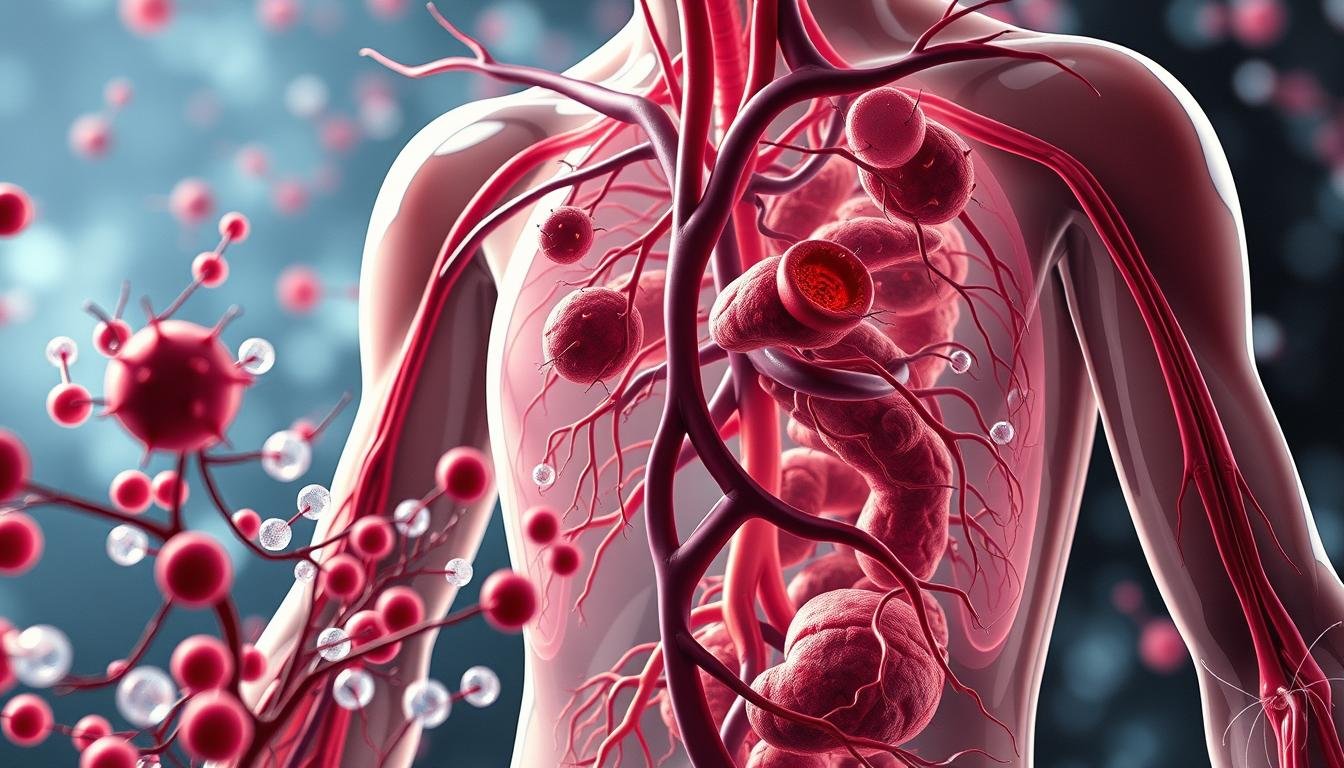Thinking about adding intermittent fasting to your routine? It’s key to know the good and bad sides. This eating pattern is a fast if it lasts 12 hours or more1. You might wonder how it affects your health and if the benefits are worth the drawbacks.
Intermittent fasting can help with weight management and may prevent or reverse some diseases2. This is a big plus for those wanting to boost their health. The 5:2 method means eating normally for 5 days and then eating very little for 2 days1. Another popular way is the 16/8 method, where you eat for 8 hours and then fast for 16 hours2.
Key Takeaways
- Intermittent fasting can lead to weight loss and better blood sugar control, which are big benefits.
- It’s important to weigh the pros and cons before starting, including possible hunger and fatigue.
- People over 65 and those with diabetes should avoid intermittent fasting1.
- It can also improve blood pressure and heart rate2.
- Always talk to a doctor before starting, if you have health issues.
- Research shows it can switch your metabolism after fasting for hours2, which is good for health.
Understanding Intermittent Fasting Fundamentals

Intermittent fasting means not eating for certain times, which can help with intermittent fasting weight loss and better intermittent fasting health effects3. Knowing the different fasting patterns is key. These include the 16/8 method, 5:2 method, and alternate-day fasting3. Adding intermittent fasting tips to your daily life can help you get the most out of it4.
Some popular intermittent fasting methods are:
- 16/8: Fasting for 16 hours, eating in an 8-hour window3
- 5:2: Eating normally for 5 days, then eating 500–800 calories on 2 fasting days3
- Alternate-day fasting: Switching between days of normal eating and days of eating less3
It’s important to remember that intermittent KPT61 fasting isn’t for everyone, like those with health issues or special diets4. Always talk to a doctor before starting any new diet to find what’s best for you.
The Truth About Intermittent Fasting: Pros and Cons in Detail

Looking into intermittent fasting results, it’s key to understand the different methods. These include alternate-day fasting, 5:2 fasting, and daily time-restricted fasting. Each has its own calorie intake rules5. Studies show it might help lower the risk of obesity-related diseases like diabetes and some cancers. It’s as effective as other diets that cut calories5.
A study with 131 people with obesity showed they lost an average of 9% of their body weight in 12 weeks6. Another review of 27 studies found that those who fasted lost between 0.8% to 13% of their body weight6. To see these intermittent fasting results, making good intermittent fasting meal plans and knowing the intermittent fasting research is vital.
Intermittent fasting can improve blood sugar control and reduce inflammation. It also boosts human growth hormone production5. But, it can cause hunger, fatigue, insomnia, nausea, and headaches. These side effects usually go away in a month5. It’s important to think about these pros and cons and your own situation before starting.
Scientific Benefits of Intermittent Fasting
Intermittent fasting offers many benefits, like weight loss and better metabolic health7. It’s key to pick a fasting schedule that fits your life. Methods like alternate-day fasting and the 5:2 diet can help with weight loss and improve insulin sensitivity8.
Creating a good fasting plan can help you lose weight safely9. It’s important to pay attention to how your body feels and adjust your fasting plan if needed. Intermittent fasting can lead to better metabolic health, more energy, and clearer thinking.
- Weight loss and improved body composition
- Improved insulin sensitivity and glucose metabolism
- Increased energy and mental clarity
- Reduced inflammation and oxidative stress
Knowing the benefits and risks of intermittent fasting helps you decide if it’s for you7. Always talk to a doctor before starting any new diet or fasting plan, even more so if you have health issues8.
Potential Drawbacks and Risk Factors
When thinking about intermittent fasting for weight loss, knowing the downsides is key. People fasting might feel hungry, tired, and irritable10. A study showed that those fasting reported more hunger than those eating all the time10.
Also, intermittent fasting weight loss isn’t for everyone, like those with health issues. Doctors say no to fasting for pregnant women, young kids, teens, and older folks who are weak10. Always talk to a doctor before starting any fasting plan, using an intermittent fasting guide or not.
Side effects of fasting include headaches, feeling tired, mood swings, and dizziness11. A study found 61.3% got headaches and 68% felt tired11. But, these effects might lessen as you get used to fasting.
To avoid bad effects, stick to a good intermittent fasting guide and listen to your body. If you have serious or lasting side effects, see a doctor right away. Knowing the risks helps you decide if intermittent fasting for weight loss is good for you.
Getting Started with Intermittent Fasting
Intermittent fasting has many methods, each with its own effects on the body. Methods like the 16/8 approach or alternate-day fasting can lead to weight loss and better blood sugar levels12. But, it’s important to know the downsides, like hunger, fatigue, and mood swings13.
First, pick a fasting schedule that fits your life and likes. Options include the 5:2 diet, where you eat 500-600 calories on two days, and time-restricted eating, where you eat in a set time12. Make sure to plan your meals well, getting all the nutrients you need13.
Here are some tips for success:
- Start with a manageable fasting schedule and gradually increase the duration as your body adapts12
- Stay hydrated by drinking plenty of water during your fasting periods13
- Listen to your body and adjust your fasting schedule as needed to avoid any negative side effects12
Remember, intermittent fasting isn’t for everyone. It’s key to find a method that fits your lifestyle. By understanding the different methods and their effects, you can make a smart choice and start improving your health13.
Conclusion: Is Intermittent Fasting Right for You?
Intermittent fasting (IF) can bring many benefits, like weight loss and better health. It can also improve your brain function and help you live longer14. But, it’s key to weigh the good and bad before starting14.
Studies show IF can help you lose a lot of fat15. Yet, it’s not for everyone. Some people might find it hard to start or keep going14. Also, those with diabetes or eating disorders should not try IF15.
Deciding to try IF should be a personal choice. It depends on your health goals, lifestyle, and talking to a doctor14. By looking at the facts and what you need, you can decide if IF is good for you15.
FAQ
What is intermittent fasting?
Intermittent fasting means eating in cycles. You alternate between fasting and eating. It doesn’t tell you what to eat, just when.
How does intermittent fasting work?
It works by making your body fast. This can help with weight loss, better insulin use, and less inflammation.
What are the common fasting patterns?
Common patterns include the 16/8 method, the 5:2 diet, and Eat-Stop-Eat. Each has its own fasting and eating times.
What are the benefits of intermittent fasting?
It can lead to weight loss, better metabolism, cell repair, and clearer thinking.
What are the possible downsides of intermittent fasting?
It might cause hunger, tiredness, and nutrient gaps if not done right.
How do I start with intermittent fasting?
Pick a schedule that suits you, plan meals, and get ready for challenges. Always talk to a doctor before starting.
Is intermittent fasting good for me?
It depends on your health goals, lifestyle, and what you like. Think about the good and bad sides and talk to a doctor.
Source Links
- What Are the Pros and Cons of Intermittent Fasting? – https://www.massgeneralbrigham.org/en/about/newsroom/articles/pros-and-cons-of-intermittent-fasting
- Intermittent Fasting: What is it, and how does it work? – https://www.hopkinsmedicine.org/health/wellness-and-prevention/intermittent-fasting-what-is-it-and-how-does-it-work
- The Pros and Cons of Intermittent Fasting Assessed – https://zoe.com/learn/intermittent-fasting-pros-and-cons
- Intermittent Fasting 101 — The Ultimate Beginner’s Guide – https://www.healthline.com/nutrition/intermittent-fasting-guide
- Is intermittent fasting good for you? – https://www.mayoclinic.org/healthy-lifestyle/nutrition-and-healthy-eating/expert-answers/intermittent-fasting/faq-20441303
- 10 Health Benefits of Intermittent Fasting – https://www.healthline.com/nutrition/10-health-benefits-of-intermittent-fasting
- Beneficial effects of intermittent fasting: a narrative review – https://pmc.ncbi.nlm.nih.gov/articles/PMC9946909/
- 10 Evidence-Based Health Benefits of Intermittent Fasting – https://www.medicalnewstoday.com/articles/323605
- Diet A to Z: Intermittent Fasting – https://www.webmd.com/diet/intermittent-fasting
- 9 Possible Intermittent Fasting Side Effects – https://www.healthline.com/nutrition/intermittent-fasting-side-effects
- Intermittent Fasting: Benefits, Side Effects, Quality of Life, and Knowledge of the Saudi Population – https://pmc.ncbi.nlm.nih.gov/articles/PMC9998115/
- Intermittent Fasting Methods wcj89 Reviewed: Pros and Cons – https://www.healthline.com/nutrition/6-ways-to-do-intermittent-fasting
- The Pros and Cons of Intermittent Fasting | Kelsey-Seybold Clinic – https://www.kelsey-seybold.com/your-health-resources/blog/the-pros-and-cons-of-intermittent-fasting
- Mya Care – https://myacare.com/blog/the-pros-and-cons-of-intermittent-fasting
- Diet Review: Intermittent Fasting for Weight Loss – The Nutrition Source – https://nutritionsource.hsph.harvard.edu/healthy-weight/diet-reviews/intermittent-fasting/











jimmy bob jr.
Wonderful advice